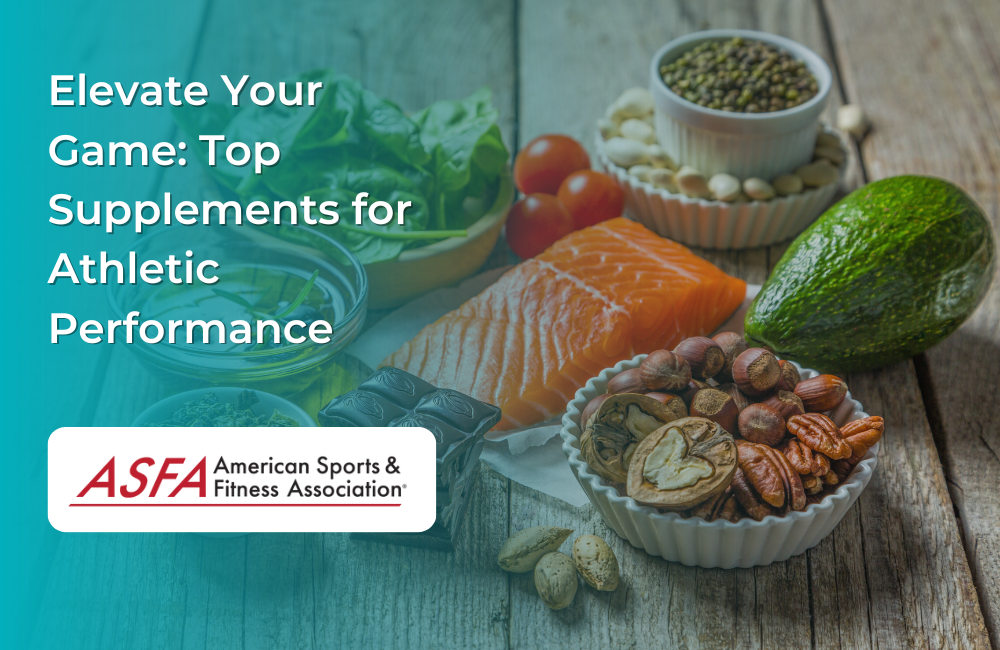Athletic performance is the result of a combination of factors, including training, nutrition, genetics, and recovery. While a well-balanced diet should be the foundation of an athlete's nutritional strategy, certain supplements can complement and enhance performance when used judiciously. In this blog, we will explore some of the top supplements for athletic performance, their potential benefits, and important considerations for their use.
Supplements for Athletic Performance
It's important to note that supplements should never replace a balanced diet. They should be used to fill specific nutrient gaps or to provide a targeted performance boost. Always consult with a healthcare professional or sports dietitian before starting any new supplement regimen.
1. Creatine:
Benefits: Creatine is one of the most well-researched and effective supplements for enhancing muscle strength and power. It can improve performance in high-intensity, short-duration activities, such as weightlifting, sprinting, and jumping.
Considerations: Creatine can lead to weight gain due to increased water retention in muscles. It's essential to stay adequately hydrated while using creatine.
2. Caffeine:
Benefits: Caffeine is a natural stimulant that can improve endurance, focus, and alertness. It can be beneficial for endurance athletes and those participating in sports that require sustained effort.
Considerations: Individual tolerance to caffeine varies, and it can lead to jitteriness, anxiety, and disrupted sleep. Proper dosing and timing are crucial.
3. Branched-Chain Amino Acids (BCAAs):
Benefits: BCAAs, including leucine, isoleucine, and valine, can support muscle recovery and reduce muscle soreness. They are particularly useful for endurance athletes and those engaged in resistance training.
Considerations: While BCAAs can be beneficial for some athletes, they should not replace a balanced protein source in the diet.
4. Beta-Alanine:
Benefits: Beta-alanine is an amino acid that can increase muscle endurance by buffering the buildup of lactic acid during high-intensity exercise. It's often used by sprinters, cyclists, and rowers.
Considerations: Beta-alanine can cause a tingling sensation (paresthesia) in some individuals. It should be taken regularly to build up in muscle tissue.
5. Whey Protein:
Benefits: Whey protein is a high-quality source of protein that can aid in muscle repair and growth. It's commonly used by athletes to support recovery.
Considerations: Whey protein is derived from dairy and may not be suitable for individuals with lactose intolerance or dairy allergies.
6. Fish Oil (Omega-3 Fatty Acids):
Benefits: Omega-3 fatty acids from fish oil have anti-inflammatory properties and can support cardiovascular health. They may reduce exercise-induced inflammation and muscle soreness.
Considerations: Ensure that fish oil supplements are of high quality and free from contaminants.
7. Vitamins and Minerals:
Benefits: Adequate intake of vitamins and minerals is crucial for overall health and athletic performance. Common deficiencies in athletes include vitamin D, calcium, iron, and magnesium.
Considerations: Supplementation should be based on individual needs and guided by blood tests to identify deficiencies.
8. Nitrate (Beetroot Juice):
Benefits: Beetroot juice contains dietary nitrates, which can improve endurance and exercise efficiency by enhancing nitric oxide production, increasing blood flow, and reducing oxygen consumption.
Considerations: Some individuals may experience gastrointestinal discomfort when consuming beetroot juice.
Customized Supplement Plans
The decision to use supplements should be made on an individual basis, taking into account an athlete's specific needs, goals, and dietary habits. It's crucial to:
- Consult a Healthcare Professional: Before starting any supplement regimen, consult with a healthcare professional or sports dietitian to assess your individual needs and potential deficiencies.
- Select Quality Products: Choose supplements from reputable brands that undergo testing for purity and quality.
- Avoid Over-Supplementation: More is not always better. Excessive supplementation can lead to imbalances and potential health risks.
- Monitor and Adjust: Continuously assess the effectiveness of your supplement plan and make adjustments as needed.
Conclusion
Supplements can be valuable tools for athletes looking to enhance their performance, support recovery, or fill specific nutrient gaps in their diet. However, they should always be viewed as supplements to a well-balanced diet, not replacements. Athletes should approach supplementation with caution, seeking guidance from healthcare professionals or sports nutrition experts to ensure that their supplement regimen aligns with their goals and is safe for their individual needs. Ultimately, the combination of proper training, nutrition, and targeted supplementation can help athletes achieve their peak performance potential.





